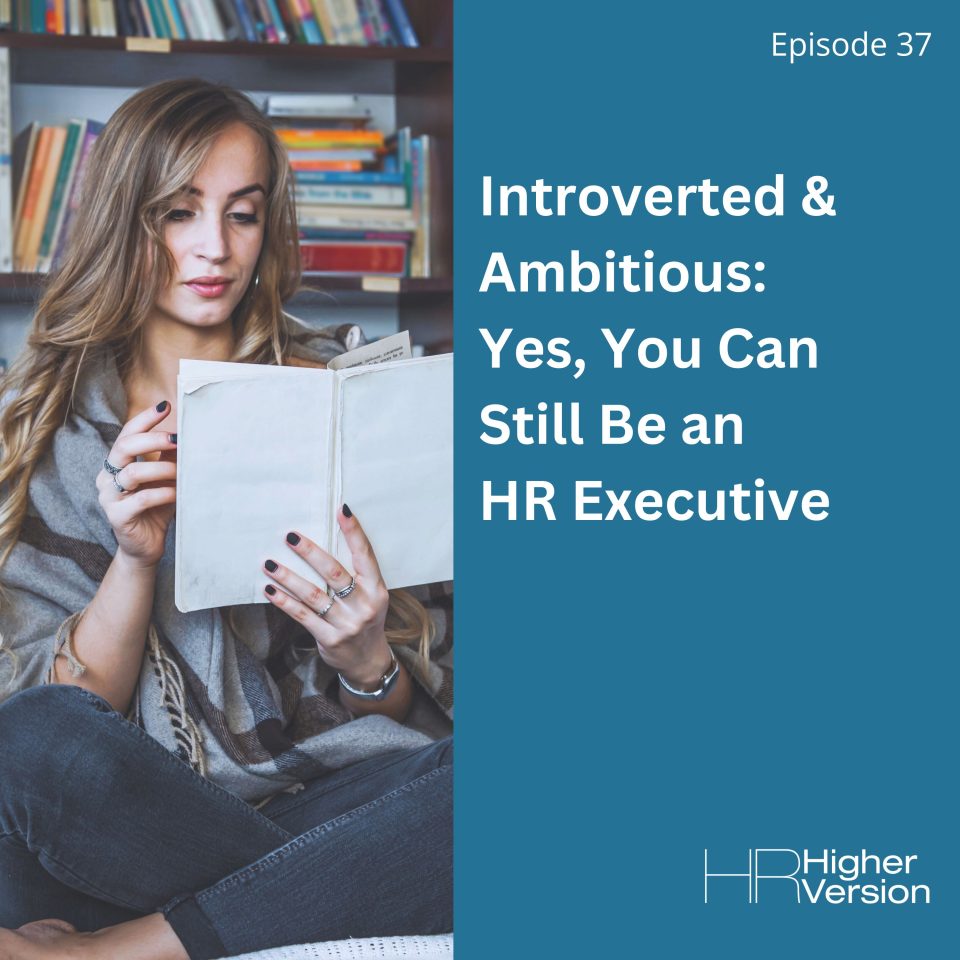Today, I want to talk to a very specific group of HR professionals.
If you’re someone who:
- Gets physically tired just thinking about small talk,
- Feels like “connecting with people” is draining, not energizing,
- Loves the work of HR but dreads the interpersonal expectations of leadership…
Then today’s episode is for you.
Because I have heard it before:
- You want to lead.
- You want to be in the room where decisions are made.
- But you don’t want to be someone you’re not.
- You’re an introvert.
- You don’t want to talk to people all day.
And my response?
You don’t have to become a different person to become an executive.
You just have to understand what leadership can look like for you.
Let’s talk about how you can be introverted, people-avoidant, low-energy socially – and still be a powerful, effective, respected executive HR leader.
The Hidden Strengths of Introverted HR Professionals
First, let’s stop apologizing for being introverted.
Because guess what introverts tend to do exceptionally well?
- Listen carefully
- Think deeply
- Prepare intentionally
- Build trust in quiet, steady ways
- Stay calm in chaos
These are not soft skills – these are executive strengths.
So the problem isn’t that you’re introverted.
The problem is that you’ve only seen one model of leadership – and it doesn’t look like you.
Rethinking HR Executive Presence (Without Becoming an Extrovert)
You don’t need to be the loudest voice in the room to own your leadership.
Executive presence is not about:
- Always being “on”
- Making the rounds for small talk
- Giving motivational speeches at the drop of a hat
It is about:
- Being clear and intentional in your communication
- Being visible when it matters
- Creating psychological safety for others
- Building influence in a way that feels true to you
You can be introverted and available.
Quiet and impactful.
Boundaried and respected.
How Introverted HR Leaders Can Stay Engaged Without Burning Out
Here’s the truth: you will need to engage with people as a leader.
But you don’t need to do it like someone else would.
You can:
- Schedule intentional 1:1 check-ins instead of open-door chaos
- Use structured updates instead of impromptu hallway chats
- Set expectations with your team about how you lead best
- Prepare for key conversations ahead of time so you don’t feel drained
Introversion is not a liability.
It’s a leadership style – and when you own it, others trust you more because you’re consistent, grounded, and intentional.
Weekly Challenge: Redesign HR Leadership for Your Energy
This week, I want you to reflect on this:
What part of leadership have you been resisting because you think you have to do it like an extrovert?
Now – rewrite it in a way that fits your energy, values, and style.
For example:
- Instead of chit-chatting every day, you can send one meaningful Friday team check-in email.
- You can book 1:1s in blocks so you can mentally prepare and recover.
- You can communicate with presence and calm – not volume.
You don’t need to become someone else to lead effectively.
You just need to lead from who you already are.
Closing
If you’ve been quietly holding back from pursuing executive-level roles because you’re introverted or people-fatigued – I want you to hear this clearly:
You don’t have to change your personality. You just need to understand your leadership energy.
And then use it intentionally.


